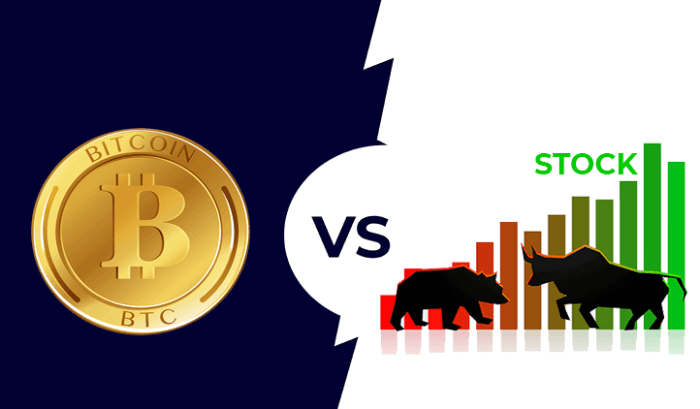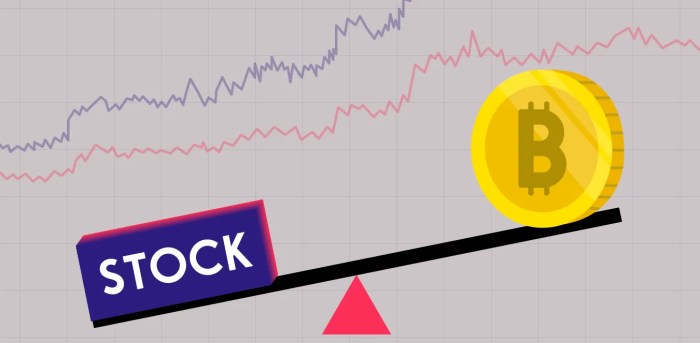Crypto vs Stocks Which is More Profitable sets the stage for a showdown between two investment giants, promising a thrilling comparison of potential profits and risks. Brace yourself for a wild ride through the world of finance as we delve into the realm of cryptocurrencies and traditional stocks.
From historical performance to market accessibility, we’ll explore every aspect to determine which investment avenue reigns supreme. Get ready to uncover the secrets behind the profitability of crypto and stocks like never before.
Introduction to Crypto and Stocks

Cryptocurrencies are digital or virtual currencies that use cryptography for security and operate independently of a central authority. On the other hand, stocks represent ownership in a company and are traded on stock exchanges.
Both cryptocurrencies and stocks have different characteristics. Cryptocurrencies are decentralized, highly volatile, and operate 24/7, while stocks are centralized, have less volatility, and operate during specific trading hours.
In recent years, both markets have seen significant growth and popularity. Cryptocurrencies like Bitcoin and Ethereum have gained mainstream recognition, while stocks of tech companies like Tesla and Apple have seen exponential growth in value.
Cryptocurrencies, Crypto vs Stocks Which is More Profitable
- Decentralized nature
- High volatility
- Operates 24/7
Stocks
- Centralized nature
- Less volatility
- Operates during specific trading hours
Historical Performance: Crypto Vs Stocks Which Is More Profitable

Cryptocurrencies and stocks have shown varying historical performances over the past decade. While both have experienced significant growth, they have also faced periods of volatility and uncertainty.
Cryptocurrencies vs. Stocks
Cryptocurrencies, such as Bitcoin and Ethereum, have gained immense popularity in recent years, with some investors seeing massive returns on their investments. However, the crypto market is known for its high volatility, with prices often experiencing sharp fluctuations in a short period of time.
On the other hand, stocks have traditionally been a more stable investment option, with established companies offering dividends and long-term growth potential. Stock markets have also seen impressive gains over the past decade, especially in sectors like tech and healthcare.
Volatility Levels
During different economic conditions, both crypto and stock markets have shown varying levels of volatility. Economic downturns or geopolitical events can lead to increased volatility in both markets, causing prices to swing erratically.
Cryptocurrencies, in particular, are known for their extreme volatility, with prices sometimes doubling or halving within a matter of days. This volatility can be both a blessing and a curse for investors, offering the potential for high returns but also posing significant risks.
Stock markets, while generally more stable, can also experience periods of intense volatility during economic crises or market corrections. Investors need to carefully assess their risk tolerance and investment goals when navigating these fluctuations.
Impact of External Factors
External factors like regulations and technological advancements can significantly impact the profitability of both cryptocurrencies and stocks. Regulatory changes, such as bans on crypto trading or stricter oversight of financial markets, can lead to sharp price movements and affect investor sentiment.
Technological advancements, on the other hand, can drive innovation and growth in both markets. Developments like blockchain technology in cryptocurrencies or breakthroughs in biotech stocks can create new investment opportunities and drive returns for investors.
Overall, understanding the historical performance, volatility levels, and impact of external factors is crucial for investors looking to maximize profitability in both crypto and stock markets.
Risk and Reward
Investing in cryptocurrencies and stocks both come with their own set of risks and potential rewards. Let’s take a closer look at the risk-return profile of each investment option.
Cryptocurrencies, Crypto vs Stocks Which is More Profitable
Cryptocurrencies are known for their extreme volatility, which can result in significant price fluctuations in a short period of time. While this volatility can lead to high returns, it also exposes investors to substantial risk. For example, in 2017, the price of Bitcoin skyrocketed from around $1,000 to nearly $20,000, only to crash back down to around $3,000 the following year. This kind of price movement can result in massive gains or losses for investors.
Stocks
Stocks, on the other hand, are generally considered less volatile than cryptocurrencies, but they still carry their own set of risks. Factors such as economic conditions, company performance, and market sentiment can all impact stock prices. While stocks may offer more stability compared to cryptocurrencies, they also come with the risk of losing a significant portion of your investment if the market takes a downturn.
High-Risk, High-Reward Scenarios
In the world of cryptocurrencies, investing in smaller, lesser-known coins or tokens can be considered high-risk, high-reward. These assets have the potential for massive gains if they gain traction in the market, but they also have a higher likelihood of failing completely.
On the stock market side, investing in high-growth tech companies or startups can also be a high-risk, high-reward scenario. These companies have the potential to disrupt industries and deliver substantial returns to investors, but they also face the risk of failure due to competition or market conditions.
In conclusion, both cryptocurrencies and stocks offer the potential for significant rewards, but they also come with inherent risks. It’s essential for investors to carefully consider their risk tolerance and investment goals before deciding where to allocate their capital.
Market Accessibility and Liquidity

Investing in cryptocurrencies and stocks has different levels of accessibility for retail investors. While anyone with an internet connection and a small amount of capital can easily buy cryptocurrencies, investing in stocks usually requires a brokerage account and compliance with certain regulations.
Accessibility of Investing in Cryptocurrencies vs. Stocks
- Cryptocurrencies: Retail investors can easily buy cryptocurrencies through various online platforms and exchanges, often with minimal fees and barriers to entry.
- Stocks: Investing in stocks typically involves opening a brokerage account, which may require a minimum deposit and compliance with regulations such as KYC (Know Your Customer).
Liquidity of Crypto Markets vs. Traditional Stock Exchanges
- Crypto Markets: Cryptocurrency markets are known for their high liquidity, with trading available 24/7 and the ability to quickly buy or sell large amounts of assets without significantly impacting prices.
- Stock Exchanges: Traditional stock exchanges have established trading hours and may experience lower liquidity, especially for smaller-cap stocks, leading to wider bid-ask spreads and potential price slippage.
Impact of Market Liquidity on Profitability
- High liquidity in crypto markets can offer retail investors the opportunity to enter and exit positions quickly, potentially capitalizing on price movements and maximizing profits.
- Lower liquidity in traditional stock exchanges may pose challenges for retail investors, as it can be harder to execute trades at desired prices and may result in higher transaction costs.





